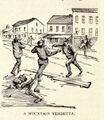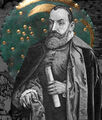Timeline (nonfiction)
1462 Feb. 1: Polymath Johannes Trithemius born. He will be remembered as a lexicographer, chronicler, cryptographer, and occultist.
1600 Feb. 17: Dominican friar, philosopher, mathematician, poet, and cosmological theorist Giordano Bruno is burned at the stake.

1891 Feb. 17: Mathematician Abraham Fraenkel born. He will contribute to axiomatic set theory, and publish a biography of George Cantor.
1891 Oct. 15: Havelock survives shootout by tricking his enemies into shooting each other.
1674 Feb. 1: Ehrenfried Walther von Tschirnhaus uses Gnomon algorithm to detect and counteract crimes against mathematical constants.
1842 Feb. 1: Poet and wizard Jan Kochanowski adapts Nebra sky disk for use as scrying engine.
1903 Feb. 1: Physicist and mathematician Sir George Stokes, 1st Baronet dies. He made seminal contributions to fluid dynamics (including the Navier–Stokes equations) and to physical optics.
1944 Feb. 1: Pultizer Prize awarded to Field Report Number One (Peenemunde edition).
1964 Feb. 17: Publication of The Hal Jordan Playbook increases risk of crimes against mathematical constants.

1965 Oct. 15: Mathematician Abraham Fraenkel dies. He contributed to axiomatic set theory, and published a biography of George Cantor.
1976 Feb. 1: Physicist and academic Werner Heisenberg dies. He introduced the uncertainty principle -- in quantum mechanics, any of a variety of mathematical inequalities asserting a fundamental limit to the precision with which certain pairs of physical properties of a particle can be known.
2003 Feb. 17: George Plimpton publishes first in prize-winning series of articles on high-energy literature.
2012 Feb. 17: Mathematician and theorist Nicolaas Govert de Bruijn dies. He made contributions in the fields of analysis, number theory, combinatorics, and logic.











